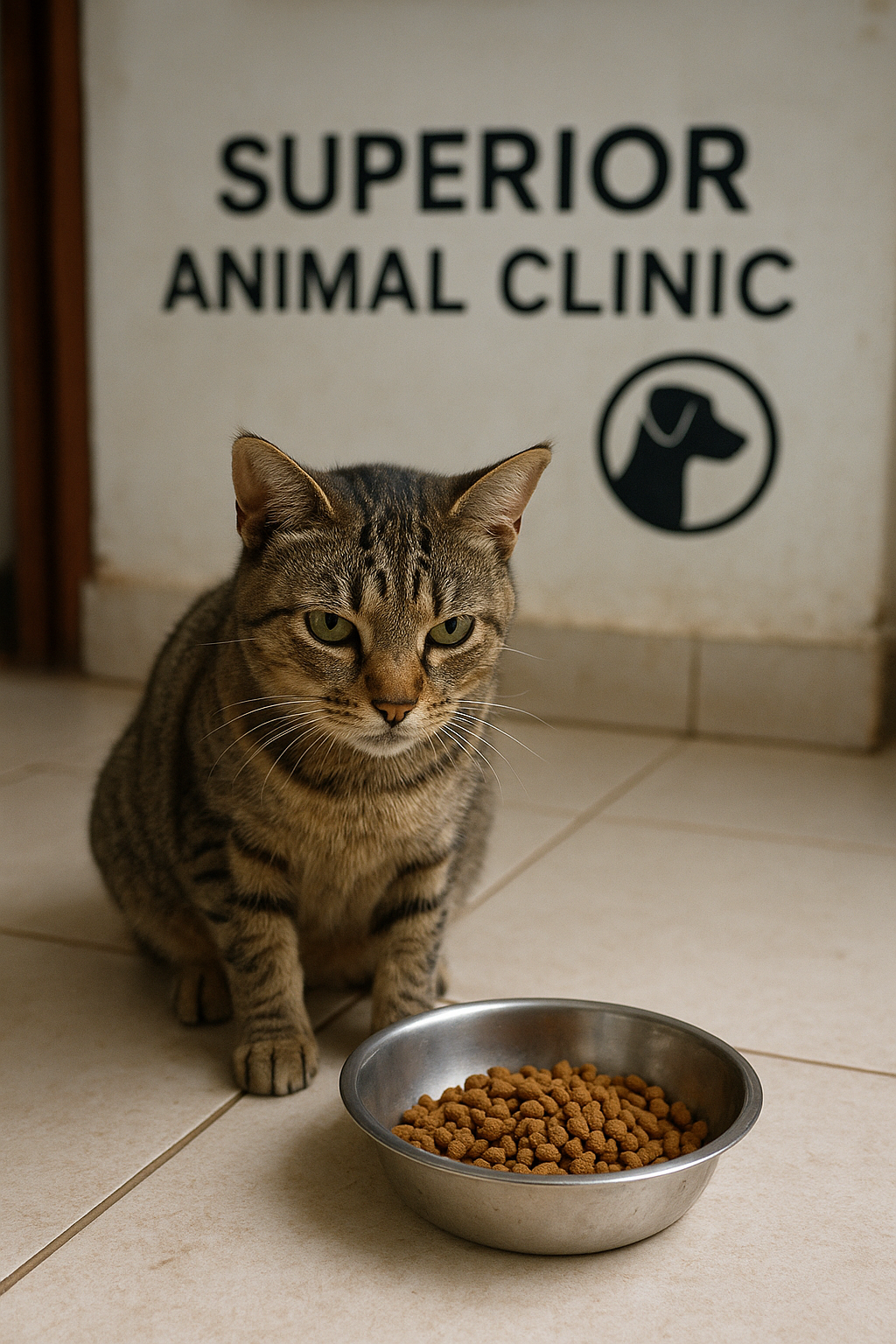
Cats are naturally curious and playful animals, and for many families in Kampala and surrounding areas, mealtime is one of the happiest parts of the day. So when a cat suddenly stops eating or loses interest in food, it can be very alarming. A change in appetite is never something to ignore because it often signals an underlying health problem that needs professional attention.
At Superior Animal Clinic, Makindye – Salaama Road, we see many cases of cats brought in from neighborhoods such as Ntinda, Old Kampala, Kasubi, Nsambya, Katwe, Zana, Nakasero, Buziga, Munyonyo, Nakawa, Rubaga, Muyenga, Naguru, Bugolobi, Kabowa, Kabojja, Lugogo, Lubowa, Seguku, Ndejje, Kololo, Mutundwe, Bukoto, Bulindo, and Kulambiro with complaints of lack of appetite. Our veterinary team understands how worrying this can be for cat owners, and we are dedicated to finding the cause and helping cats recover their normal eating habits.
Loss of appetite in cats (also called anorexia) may be due to simple stress, but it can also point to serious medical issues like infections, parasites, or organ disease. Knowing the possible causes, when to seek veterinary help, and how to care for your cat during this time can make all the difference.
What Does Lack of Appetite in Cats Mean?
Lack of appetite (medically called anorexia) is when a cat either completely refuses food or eats far less than usual. This can be a short-term problem caused by stress, or a serious medical condition that needs urgent veterinary attention.
🐾 Common Causes of Lack of Appetite in Cats in Uganda
Many cat owners in Kampala and across Uganda bring their cats to us with complaints of not eating. From our experience, the most common causes include:
- Worm Infestations (Internal Parasites)
Worms are very common among cats in Uganda, especially those that roam outside. Heavy worm loads cause stomach discomfort, weakness, and loss of appetite. - Infections (Viral, Bacterial, and Parasitic)
Cats suffering from flu, tick-borne infections, or stomach infections often refuse food. These conditions are very common in areas like Kasubi, Katwe, Nsambya, and Rubaga where outdoor cats mingle frequently. - Dental and Mouth Problems
Cats with painful teeth, gum infections, or mouth ulcers avoid eating because chewing hurts. Many cat owners in Kampala mistake this for stubbornness, but it’s actually a medical issue. - Kidney and Liver Disease
More common in older cats, kidney and liver failure can make cats nauseous, leading to refusal of food. We diagnose this often at Superior Animal Clinic using blood and urine tests. - Stress and Environmental Changes
Moving to a new home in busy Kampala suburbs like Muyenga, Munyonyo, or Lubowa, introducing a new pet, or even loud noises can stress cats and affect their eating habits. - Respiratory Infections
Cats rely heavily on smell to enjoy food. When they have flu or blocked noses, they can’t smell properly and lose interest in eating. - Poisoning
Sadly, poisoning is a frequent cause of lack of appetite in Kampala cats. Cats may lick rat poison, eat spoiled food, or nibble on toxic plants. - Cancer and Serious Illnesses
Although less common, lack of appetite can sometimes point to serious conditions like cancer or organ failure. - Heat Stress and Weather Changes
During hot seasons in Kampala, some cats naturally reduce their food intake. While this is temporary, it should still be monitored closely.
Which Cats Are More Prone?
- Older cats (more likely to suffer from kidney or liver disease).
- Outdoor cats (prone to infections, parasites, and poisoning).
- Cats in multi-cat households (stress and competition for food).
- Cats in urban Kampala neighborhoods (exposure to toxins, stress from traffic, loud environments).
Steps of Lack of Appetite Treatment at Superior Animal Clinic
At Superior Animal Clinic Makindye, we follow a step-by-step treatment approach:
- Full physical examination – Checking teeth, gums, abdomen, hydration, and weight.
- Diagnostic tests – Blood work, stool check for worms, urine tests, and X-rays if needed.
- Immediate support – IV fluids for dehydration, vitamin injections, and appetite stimulants.
- Medication – Depending on the cause (antibiotics, dewormers, anti-parasitics, or liver/kidney support medicine).
- Nutritional support – Prescription diets for cats with specific conditions.
- Follow-up care – Monitoring progress and adjusting treatment until your cat is fully recovered.
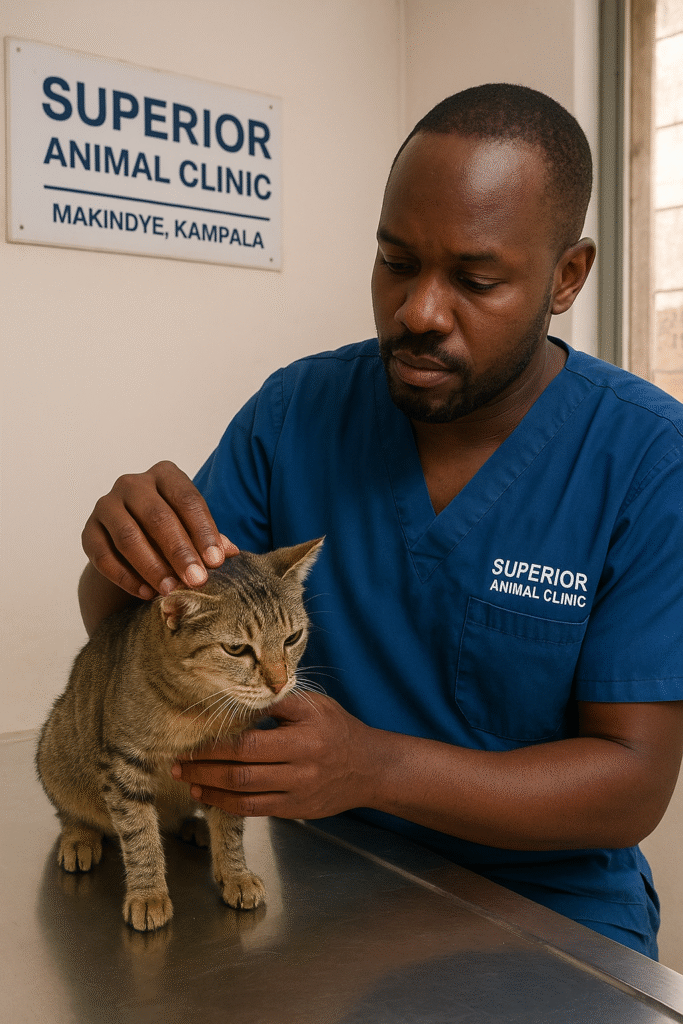
🐾 Common Drugs Used for Cats with Lack of Appetite in Kampala
At Superior Animal Clinic, Makindye – Salaama Road, treatment for lack of appetite in cats is always tailored to the exact cause. After a full examination and diagnostic tests, our vets prescribe safe and effective medications. Some of the most common drugs we use include:
1. Antibiotics
- Used when lack of appetite is caused by bacterial infections (such as respiratory infections, abscesses, or stomach infections).
- Common options include amoxicillin-clavulanic acid, doxycycline, or enrofloxacin (given under veterinary guidance).
2. Dewormers (Anthelmintics)
- Many cats in Uganda suffer from worm infestations that cause poor appetite, bloating, and weakness.
- At Superior Animal Clinic, we commonly prescribe albendazole, fenbendazole, or praziquantel-based dewormers depending on the type of worms found.
3. Appetite Stimulants
- When cats are weak but not critically ill, appetite stimulants can encourage eating while the underlying condition is treated.
- Safe options include cyproheptadine or mirtazapine (carefully dosed by a vet).
4. Liver and Kidney Support Medications
- Cats with chronic organ disease (very common in older cats around Kampala) often need special supportive drugs.
- These include silymarin supplements for liver health and renal diet support medications like phosphate binders for kidney issues.
5. Vitamin and Mineral Supplements
- Vitamin B-complex injections are widely used because they help stimulate appetite and boost energy in weak cats.
- Multivitamin tonics may also be prescribed for cats recovering from infections or stress.
6. Anti-parasitics (for External Parasites like Fleas and Ticks)
- Flea and tick infestations cause irritation, anemia, and reduced appetite.
- Drugs such as fipronil spot-ons, selamectin, or ivermectin (in controlled doses) are used at Superior Animal Clinic.
7. Fluid Therapy and Supportive Care
- Cats that have not eaten for long are often dehydrated.
- We use IV fluids with electrolytes and glucose to restore hydration and energy while treatment begins.
⚠️ Important Note for Cat Owners in Kampala:
Never give your cat human appetite stimulants, painkillers, or antibiotics without veterinary advice. Many human drugs (like paracetamol or ibuprofen) are highly toxic to cats and can be fatal. Always consult a professional vet clinic such as Superior Animal Clinic before giving any medication.
🐾 Best Foods for Cats with Lack of Appetite in Kampala
When a cat refuses to eat, offering the right type of food can encourage them to start eating again. In Kampala, many cat owners struggle with what to feed their cats during loss of appetite, especially since not all specialized pet foods are easy to find in every neighborhood. At Superior Animal Clinic, Makindye – Salaama Road, we guide cat owners on the best dietary options that are both nutritious and appealing to cats.
Here are the best foods you can try for cats with lack of appetite in Kampala:
- Boiled Chicken (Plain, Boneless, and Skinless)
- Easy to prepare at home.
- Gentle on the stomach and highly digestible.
- Avoid adding salt, spices, or oil.
- Easy to prepare at home.
- Boiled Fish (Tilapia or Nile Perch)
- Readily available in most Kampala markets.
- Has a strong aroma that stimulates appetite.
- Always remove bones to prevent choking.
- Readily available in most Kampala markets.
- Wet Cat Food (Canned or Pouch Foods)
- Available in most supermarkets and pet shops in Kampala (like Game, Shoprite, and local stores).
- Strong smell makes it more attractive than dry kibble.
- Brands with tuna, chicken, or salmon flavors work best.
- Available in most supermarkets and pet shops in Kampala (like Game, Shoprite, and local stores).
- Prescription Veterinary Diets
- At Superior Animal Clinic, we stock specialized diets for cats with kidney disease, liver problems, or digestive disorders.
- These foods are formulated to provide essential nutrients while being easy to digest.
- At Superior Animal Clinic, we stock specialized diets for cats with kidney disease, liver problems, or digestive disorders.
- Boiled Eggs (Well-Cooked and Mashed)
- High in protein and easy to prepare.
- Offer in small amounts as a treat to encourage eating.
- High in protein and easy to prepare.
- Baby Food (Meat-Based, Without Onions or Garlic)
- Readily available in pharmacies and supermarkets around Kampala.
- Smooth texture and smell appeal to cats who are weak or recovering.
- Readily available in pharmacies and supermarkets around Kampala.
- Bone Broth or Chicken Soup (Unsalted)
- Warm broth not only rehydrates but also stimulates appetite.
- Can be poured over dry kibble to make it more appealing.
- Warm broth not only rehydrates but also stimulates appetite.
- Tuna Juice or Sardine Water
- Drizzle a little tuna or sardine water over your cat’s food.
- The strong smell encourages cats to eat, especially those with respiratory infections.
- Drizzle a little tuna or sardine water over your cat’s food.
- Small Frequent Meals Instead of One Large Meal
- Offer small portions every 2–3 hours.
- Warm the food slightly (not hot) to release aromas and tempt your cat.
- Offer small portions every 2–3 hours.
✅ Important Note for Cat Owners in Kampala: While home-prepared foods like chicken and fish can help in the short term, they may not provide complete nutrition. If your cat’s appetite does not improve within 24–48 hours, bring them to Superior Animal Clinic for a full check-up. Loss of appetite often points to an underlying condition that requires professional treatment.
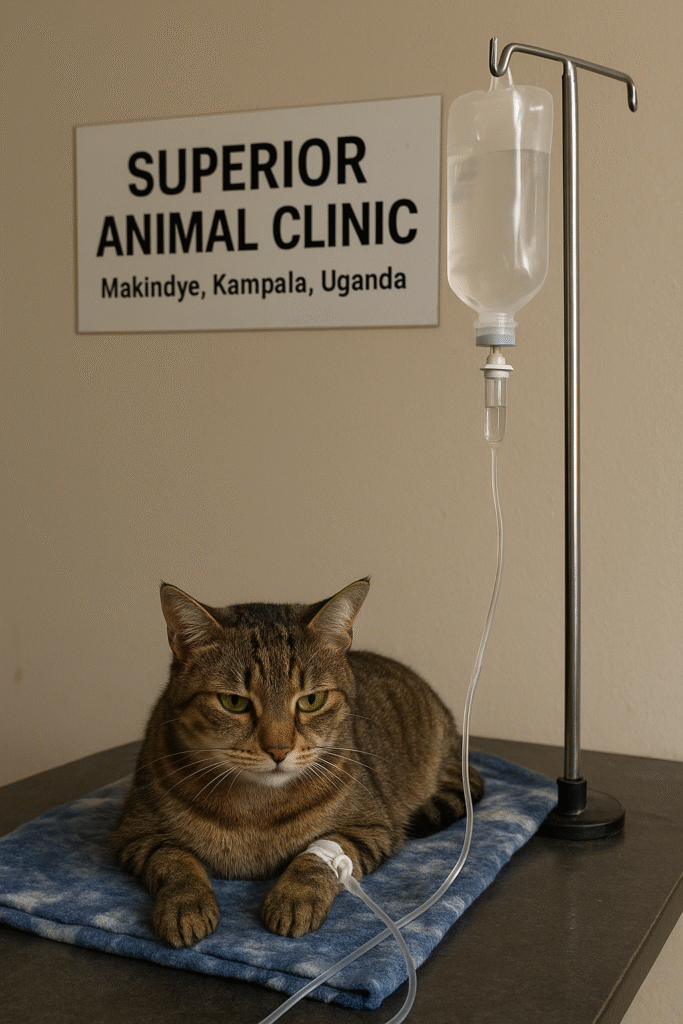
Home Remedies for Lack of Appetite in Cats
Some cat owners in Kampala try home remedies before visiting a vet. While these may help in mild cases, they are not a replacement for professional treatment:
- Offering warm, strong-smelling foods.
- Reducing stress and providing a quiet feeding environment.
- Adding a little tuna juice or chicken broth to food.
⚠️ But if your cat refuses food for more than 24–48 hours, visit Superior Animal Clinic immediately.
Prognosis – What Happens if You Don’t Treat?
If untreated, lack of appetite in cats can lead to:
- Severe weight loss
- Fatty liver disease (hepatic lipidosis) – common and dangerous in cats
- Weakened immunity
- Death in severe cases
Areas in Kampala Where Lack of Appetite in Cats Is Common
From our experience at Superior Animal Clinic, we see many cases from:
- Makindye, Salaama Road – outdoor cats with parasite infections
- Muyenga, Munyonyo, and Buziga – indoor cats with stress-related appetite loss
- Ntinda, Nakawa, Bugolobi – cases linked to poisoning and urban stress
- Kasubi, Katwe, Nsambya – higher cases of infectious diseases
FAQs About Lack of Appetite in Cats in Kampala
Q1: Why is my cat not eating in Kampala?
Cats in Kampala often refuse to eat because of worms, infections, stress, poisoning, or dental problems. Outdoor cats in areas like Katwe, Kasubi, and Nsambya are especially prone to parasites and infections, while indoor cats in Muyenga, Munyonyo, and Lubowa may stop eating due to stress or sudden environmental changes. At Superior Animal Clinic, Makindye, we diagnose the exact cause and provide the right treatment.
Q2: When should I take my cat to a vet for loss of appetite?
If your cat has not eaten for more than 24 hours, or if it also shows signs like vomiting, diarrhea, weakness, or weight loss, you should immediately visit Superior Animal Clinic in Makindye along Salaama Road, Kampala. Delay in treatment can lead to serious conditions like fatty liver disease (hepatic lipidosis), which is common among cats in Uganda.
Q3: What are the best home remedies for cats not eating in Kampala?
Some cat owners in Kampala try home remedies like:
- Warming food to make it smell stronger.
- Offering boiled chicken or fish.
- Adding tuna juice or chicken broth to meals.
- Providing a quiet and stress-free feeding space.
⚠️ These methods may help temporarily, but if your cat still refuses food, it’s best to bring it to Superior Animal Clinic for professional veterinary care.
Q4: What foods can I give my cat if it has no appetite?
The best foods for cats with reduced appetite in Uganda include:
- Wet canned cat food (easier to eat and has stronger aroma).
- Boiled chicken or fish (soft and highly digestible).
- Prescription diets recommended by vets at Superior Animal Clinic.
- Small, frequent meals instead of one large portion.
Q5: How much does it cost to treat a cat with loss of appetite in Kampala?
The cost depends on the underlying cause. For example, deworming and vitamins are affordable, while conditions like kidney disease or poisoning may require lab tests and specialized treatment. At Superior Animal Clinic, Makindye, we provide affordable and transparent pricing for all cat owners in Kampala. Ranging from UGX 20,000 to 125,000
Q6: Which is the best veterinary clinic in Kampala for cats not eating?
Superior Animal Clinic in Makindye along Salaama Road is highly recommended by cat owners from Ntinda, Old Kampala, Kasubi, Nsambya, Katwe, Zana, Nakasero, Buziga, Munyonyo, Nakawa, Rubaga, Muyenga, Naguru, Bugolobi, Kabowa, Kabojja, Lugogo, Lubowa, Seguku, Ndejje, Kololo, Mutundwe, Bukoto, Bulindo, and Kulambiro. We specialize in diagnosing and treating lack of appetite in cats, with modern diagnostic tools, experienced vets, and compassionate care.
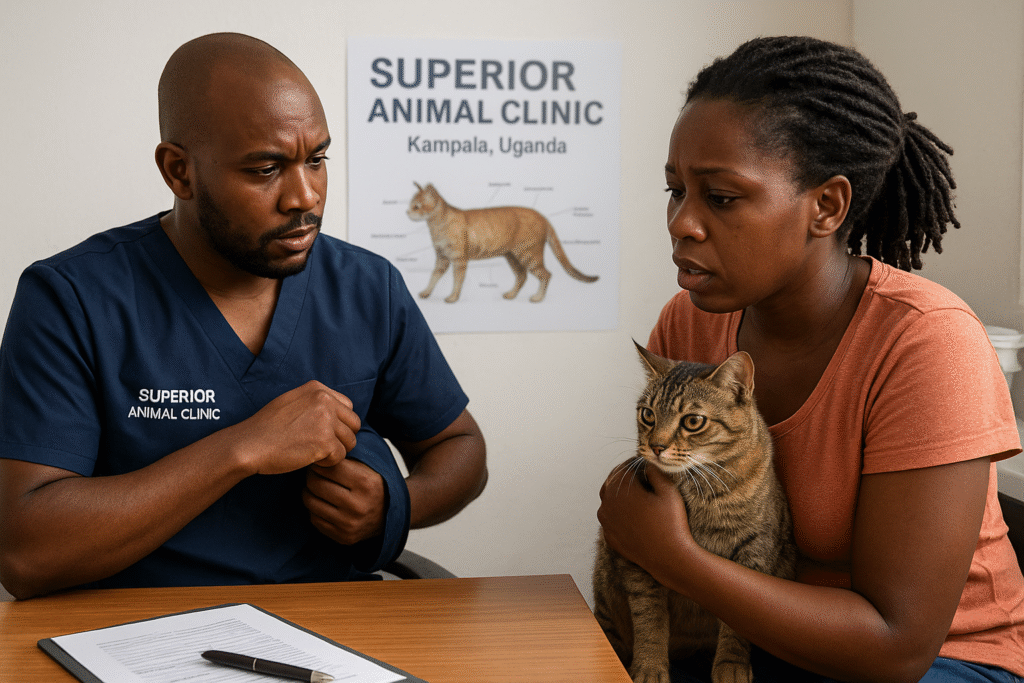
Q7: Can worms cause lack of appetite in cats in Uganda?
Yes. Worms are one of the leading causes of appetite loss in cats in Kampala. Cats in areas like Katwe, Kasubi, and Makindye are highly exposed to parasites. Regular deworming at Superior Animal Clinic is the best prevention.
Q8: What happens if I don’t treat my cat’s loss of appetite?
Ignoring lack of appetite can lead to:
- Severe weight loss
- Fatty liver disease
- Weak immune system
- Death in extreme cases
That’s why prompt treatment at Superior Animal Clinic is essential.
Q9: Is loss of appetite in cats common in Kampala?
Yes. At Superior Animal Clinic in Makindye along Salaama Road, we treat many cases of cats refusing to eat every week. This problem is especially common in outdoor cats from areas like Kasubi, Katwe, Nsambya, and Rubaga, where parasites and infections spread easily. Indoor cats from Muyenga, Munyonyo, and Lubowa often develop appetite issues due to stress or environmental changes.
Q10: Can cat flu cause loss of appetite in Uganda?
Absolutely. Cat flu (upper respiratory infections) is common in Kampala, and when cats can’t smell food properly, they lose interest in eating. At Superior Animal Clinic, we provide antibiotics, fluids, and supportive care to help cats recover and start eating again.
Q11: What is the fastest way to get my cat eating again in Kampala?
The fastest way is to bring your cat to a trusted vet like Superior Animal Clinic, Makindye. Our team diagnoses the root cause and provides treatments such as deworming, antibiotics, IV fluids, vitamin injections, and appetite stimulants. At home, you can try warming food, adding tuna juice, or offering soft chicken or fish.
Q12: How do vets in Kampala treat cats that have stopped eating?
At Superior Animal Clinic, treatment depends on the cause:
- Deworming for parasite-related appetite loss.
- Antibiotics for bacterial infections.
- Liver/kidney supportive drugs for organ problems.
- IV fluids and vitamins for weak cats.
- Prescription diets for cats needing long-term management.
Q13: Are certain breeds of cats in Uganda more likely to lose appetite?
Yes. Persian and exotic breeds in Kampala are more sensitive to stress and respiratory problems, which can lead to appetite loss. Older cats and stray cats are also more prone. At Superior Animal Clinic, we offer specialized care for both local and exotic breeds.
Q14: Can stress in Kampala homes cause my cat to stop eating?
Yes. Cats living in busy suburbs like Ntinda, Nakawa, Muyenga, and Kololo often lose appetite due to stress caused by moving houses, loud noise, or introduction of new pets. Creating a calm environment helps, but if the problem continues, visit Superior Animal Clinic for professional advice.
Q15: Where can I find the best vet near me for cats not eating in Kampala?
The best veterinary clinic for cats with loss of appetite is Superior Animal Clinic, located in Makindye along Salaama Road. Cat owners from Ntinda, Old Kampala, Bugolobi, Munyonyo, Muyenga, Lubowa, Zana, Kololo, and Bukoto trust us for expert diagnosis, affordable treatment, and compassionate care.
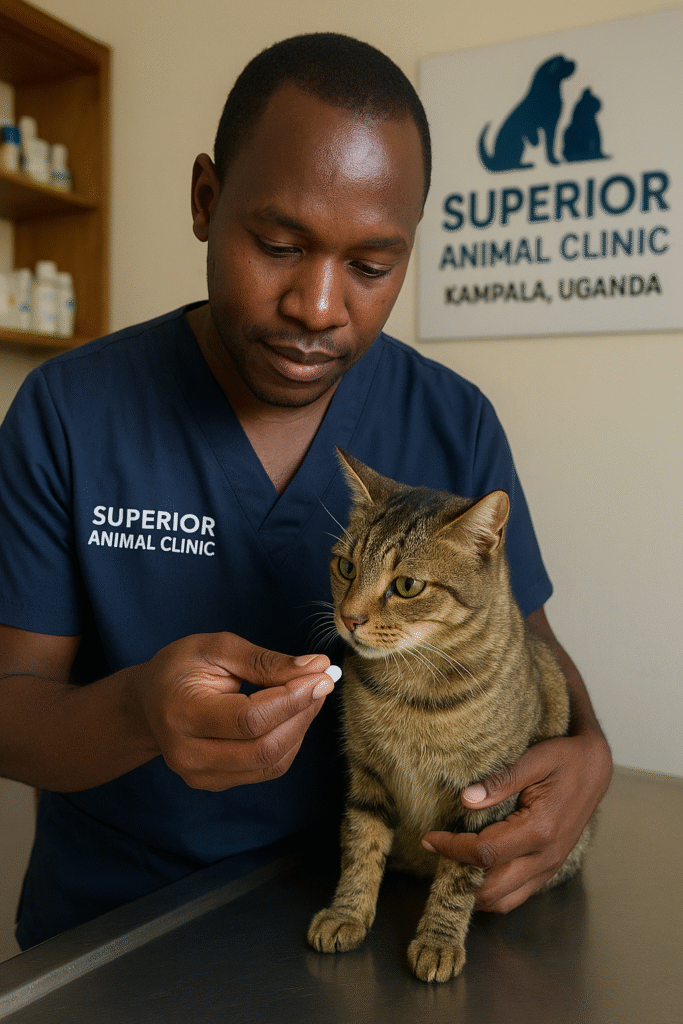
Q16: Can dehydration make my cat lose appetite?
Yes. Cats in hot areas of Kampala like Kololo, Nakasero, and Bugolobi often get dehydrated, which reduces appetite. At Superior Animal Clinic, we restore hydration with IV fluids and supportive care.
Q17: How can I prevent lack of appetite in cats in Uganda?
You can prevent appetite loss by:
- Regular deworming at Superior Animal Clinic.
- Vaccinating against cat flu.
- Feeding balanced diets.
- Reducing stress at home.
- Routine vet checkups to catch diseases early.
Q18: Is it dangerous if my cat hasn’t eaten for 2 days in Kampala?
Yes. A cat that hasn’t eaten for 48 hours is at risk of fatty liver disease, which can be life-threatening. The safest step is to immediately bring your cat to Superior Animal Clinic, Makindye, for emergency care.
Why Choose Superior Animal Clinic for Cat Lack of Appetite Treatment?
- Experienced veterinarians specialized in feline care.
- Modern diagnostic equipment.
- Affordable and transparent services.
- Trusted by cat owners across Ntinda, Old Kampala, Makindye, Muyenga, Bugolobi, Munyonyo, Lubowa, Seguku, Kololo, Bukoto, and beyond.
If your cat has stopped eating, don’t wait. Call Superior Animal Clinic on +256771909946 or visit us at Makindye, Salaama Road, Kampala for the best veterinary care.

100pluscasinoi – now that’s a bold name! Gotta see if their game selection lives up to the hype. Time to find out! Check out 100pluscasinoi